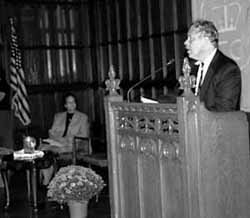State of the College: 2002
Students and faculty filled the newly renovated Milbank Chapel September 18th to hear TC President Arthur Levine and Darlyne Bailey, Vice President of Academic Affairs and Dean of the College, deliver the State of the College address.
In "Reflections on the Past Year," Levine began with a retrospective of the past eight years, "a period of unprecedented growth and rebuilding for TC." As the nation recovered from a prolonged economic downturn, "we enlarged our faculty, reduced teaching loads, launched several important initiatives, and redefined TC as an activist institution, committed to universal access to quality education, especially for disadvantaged and urban peoples," he said. The college also sought to place itself on a sound financial footing. "We eradicated our debt while building our capital strength, and for the first time instituted real financial controls and budget processes," Levine said. "We launched a capital campaign, improved our administrative services, created a technology infrastructure, and gained new visibility in the community."
But while all these achievements are essential to the College's survival and well-being, "they aren't why we come to TC," Levine said. "If the College's motive is to repair the world through education, we still have some very big challenges before us." More than 120 million children worldwide are not in school, and more than 20 million children died of preventable diseases in 2001, he noted. "In the U.S., poverty rates are going up and an alarming number of children have no healthcare insurance." Meanwhile, the educational divide remains wide, as evidenced by high dropout rates, the hiring of unprepared teachers in urban school systems, and declining access to college by the poor.
Notwithstanding the College's commitment to research and its ability to apply its knowledge to solving social problems, "We still have to ask ourselves some critical questions," Levine said. "Are we properly focused on the right things? Are we using our skills and knowledge to improve practice-or are our efforts in that direction being diluted by differences between us? Are we making a difference in the community? Are we truly helping to shape national discourse on education and education policy?"
The college has been active on all these fronts. "But we need to accomplish more," Levine said. "That's the reason we need to maintain a black bottom line, build our information technology infrastructure, and maintain our physical plant."
As for the past year, "it has been one of the most painful we have ever lived through." While the September 11th attacks brought the TC community together in many ways, "it also distracted us." As the economy struggled, the flow of foundation dollars slowed. Meanwhile, the college faced many unanticipated expenses, including a 300 percent increase in insurance.
Nonetheless, TC is a stronger institution than it was a year ago, Levine said. "We still have a lot to do," he added. But the drafting of a strategic plan for TC together with the College's participation in the NCATE (National Council for Accreditation of Teacher Education) accreditation process "provide an ideal opportunity to ask ourselves some tough questions."
In her remarks, titled "Listening to Our Inner Voice," Dean Bailey shared the results of in-depth conversations she has held with TC students, and faculty staff since joining the College last January.
Published Monday, Feb. 24, 2003
